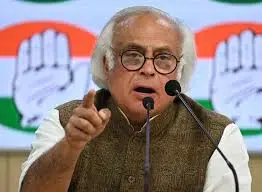Same PM who abused Congress, taking its help for diplomatic delegations: Jairam Ramesh

Senior Congress leader Jairam Ramesh has accused the Prime Minister of hypocrisy. He pointed out a sharp contradiction between the Prime Minister’s public criticism of Congress and his government’s secret reliance on the party’s help in diplomatic matters.
India is currently focused on an active foreign policy. It has several important diplomatic visits and partnerships in the works. According to Ramesh, the Prime Minister often attacks Congress but turns to the party behind the scenes. This exposes a major political inconsistency.
The Hypocrisy Charge
Jairam Ramesh did not hold back in his criticism. He said the Prime Minister frequently abuses Congress in public. Yet, when managing diplomatic delegations, he depends on Congress’s network and experience.
“This is the same Prime Minister who blames Congress for many national problems,” Ramesh said. “But when it comes to diplomacy, he needs Congress’s contacts. This contradiction is impossible to ignore.”
Ramesh’s words reveal a political reality many have suspected. The government says it sidelines the opposition. But the truth shows practical cooperation beyond political battles.
Congress’s Diplomatic Strength
The Congress party has a rich history in foreign affairs. From Jawaharlal Nehru’s leadership and the Non-Aligned Movement to more recent policies, Congress shaped India’s international relations.
This long legacy means Congress has a strong diplomatic network. These contacts remain valuable no matter who is in power.
Ramesh highlighted this fact. While the government speaks against Congress, it cannot ignore the party’s deep ties abroad. This is especially true when handling complex diplomacy.
Political Impact and Public Story
Ramesh’s comments come at a tense political moment. India faces important elections soon. The opposition wants to expose what it calls the ruling party’s double standards.
Experts say Ramesh’s critique serves two goals. First, it reminds voters that Congress still holds influence. Second, it questions the Prime Minister’s sincerity in public speeches, which often paint Congress as harmful.
Political analyst Dr. Meera Singh said, “Congress wants to show it is not just an opposition party. It is also a key player in governance. By revealing this cooperation, Congress signals its importance for India’s global standing.”
Government’s Side and Diplomatic Approach
The ruling party has not formally responded to Ramesh’s claims. However, sources say diplomacy often involves many political and bureaucratic actors. They stress that foreign policy requires unity beyond party lines.
Still, the claim sparked debate about government transparency. Many see this as a rare glimpse of political pragmatism. While political rhetoric is harsh, governance demands collaboration—even with rivals.
Why This Matters: Trust in Politics
Ramesh’s statement raises questions about political trust. When leaders publicly attack a party but privately depend on it, voters may lose faith.
Such contradictions make political promises seem less credible. This issue is critical in today’s polarized and misinformation-filled political environment.
Ramesh urges people to question official narratives. He calls for honest, consistent communication from those in power.
Conclusion: Politics Beyond Words
Jairam Ramesh’s remarks expose the complicated mix of rivalry and cooperation in politics. The Prime Minister and ruling party may publicly criticize Congress. Yet, they rely on Congress’s expertise for diplomacy.
India’s rise on the world stage depends on steady foreign relations. Cooperation behind the scenes helps maintain this.
However, political leaders must align their words with their actions. Doing so would build greater public trust.
This episode shows that politics is rarely simple. Governance involves complex ties and compromises. Whether this affects the government’s image remains to be seen. But it surely gives voters much to consider.






